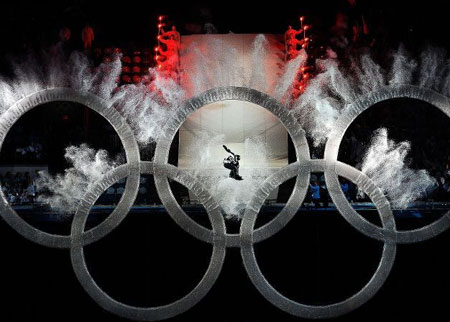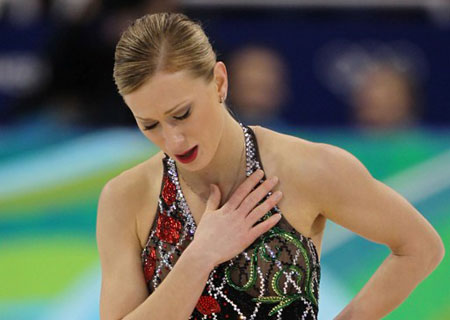
With the latest edition of the Winter Olympics soon approaching its end, much of the focus right now is on tallying up medal counts and reviewing the performances of the various athletes in their particular events. However, this is also a good opportunity to look at some of the concepts leaders and businesses can learn from the Olympic Games.
While there are some obvious ones, like the importance of teamwork and understanding interpersonal dynamics, there are other valuable lessons businesses can learn from this international event. To help illustrate these points, let’s take a look at these three memorable stories from the Olympics:
Collaboration goes beyond borders

At the 2006 Torino Winter Olympics, Canadian skier Sara Renner encountered a situation I’m sure she never imagined would happen. In the middle of the cross-country team sprint race, one of her ski poles was accidentally broken by another skier, leaving her with only one pole to continue the race with. That is, until one of the ski coaches rushed out onto the track to give her his ski pole so she could keep going without any difficulty. Thanks to the quick response of this coach, Renner and her teammate Beckie Scott went on to win the silver medal in this event.
While it was a proud moment for Canadians, what really made it incredible was that this coach, Bjornar Hakensmoen, was not Canadian; instead, he was one of the coaches for the Norwegian team. Despite the fact that Renner was competing against his team in this event, Hakensmoen didn’t hesitate to help Renner when it looked like she wouldn’t be able to finish. In that moment, it was no longer about the borders that define Canada and Norway; instead, it was about people coming to the aid of others to ensure that everyone would have a fair chance to complete the race.
Obviously, in terms of business, the question of moving past borders refers not to those of a country, but those we use to define our departments, our team, and even our individual efforts. By focusing solely on how an effort impacts us, our team, or our department, we’re denying ourselves the opportunity to participate in something bigger than ourselves, if not help to contribute to something that might have a lasting impact on a greater scale. As the example of Renner and Hakensmoen shows, the ability of us to collaborate and come to the help of others should not be restricted to whatever boundaries we create around us. Instead, it should be defined by what we’re able to contribute to assist in the pursuit of reaching that shared goal.
Competing with a sense of empathy and respect

The gold medal win by Canadian ice dancers Tessa Virtue and Scott Moir at the Vancouver Winter Games is certainly a historic one. After all, not only are they the first North American team to ever win the gold medal in ice dancing, they are also the youngest. But what really makes their story exceptional is the relationship they have with the ice dancing team from the United States, Meryl Davis and Charlie White, who took the silver medal in this event.
Although these pairs are competing for different countries, they both train at the same skating club. This has given them insights into the strengths and abilities of the other team and as such, ideas of what they need to do in order to surpass them in competition on the ice. It has also fostered a friendship based on a sense of mutual respect when they go into competition with one another.
After Virtue and Moir were announced as the gold medal winners, they were greeted off the ice by Davis and White who warmly embraced the Canadian pair to congratulate them on their win. Watching these two pairs hugging and smiling, there was no doubt that the American team was genuinely happy for their Canadian competitors, even if they beat them in winning the top prize. And in post-competition interviews, Virtue and Moir credited their American competitors as one of the reasons they pushed themselves to be better and stronger in their performance, a performance that lead to their winning the gold medal.
Competition is certainly nothing new to the business world. But unlike what we often see among athletes at the Olympic Games, it’s rare that we look at our competitors as being behind our drive to improve our products or services to surpass what our competition is aiming to achieve. As these two ice dancing teams have shown, it is possible to compete against others with a spirit of respect and empathy and still end up winning the gold.
Finding courage through our focus

Like most athletes, Canadian figure skater Joannie Rochette has learned how to tune out the boisterous cheering from the audience to concentrate on doing what she’s spent the last couple of years training for – a chance at winning an Olympic medal. Unfortunately for Rochette, though, she’s had another, much more painful distraction to deal with going into her competition at the Vancouver Winter Games. Mere hours before Rochette took to the ice for the first practice session for the ladies’ figure skating event, she was told that her mother had just died of a heart attack within hours of arriving in Vancouver to watch her daughter skate.
This past Tuesday, the figure skaters took to the ice for the women’s short program and Rochette was there amongst them. As she skated out onto center ice to begin her performance, all eyes were on her, hoping she’d be able to present the performance she had within her despite her personal tragedy. During her short program skate, there was an unmistakable look of concentration and focus on her face, of understanding what she was capable of delivering. It was only after her skate was over that she allowed herself a moment to let out some of the turbulent emotions she must be feeling inside surface, knowing that she had completed a solid performance. And by the end of the women’s short program, Rochette was standing in third place with a shot at an Olympic medal, as well as capturing the hearts of those who watched her courageous performance.
Although in the business world, we’d never face the level of emotional tragedy that Rochette is dealing with, there is still a valuable lesson here on how leaders can summon the courage needed in these challenging economic times through focusing on the shared goal they have with their team members. Many businesses and their leaders are facing some tough choices these days, in trying to ascertain not only how to get through the tough economic waters of today, but also in trying to figure out what will make their companies successful and thrive when the tide turns around.
As we saw with Rochette, by focusing on what our goal is, we can summon the courage needed to press ahead despite whatever adversities we are currently facing. Rochette’s performance during the women’s short program was not only inspiring and heart-felt, it was a poignant reminder of the ability within all of us to use the power of our focus to give us the courage to do what needs to be done.
Unquestionably, the Olympics Games are a great showcase of the human spirit and our innate drive to excel and succeed in the face of challenges and adversities. But as these stories above show, it can also inspire us to re-think how we approach our business and how we treat the people who share our goals and dreams for success.

Thank you for the excellent post. I very rarely take the time to comment but your blog made me do it. You now have a new subscriber.
Tanveer,
You have to love how the Olympics can teach us about who we are and how we act in the midst of our business. I'm thankful that you have taken the time to integrate the two.
Collaboration, Competition and Courage are all needed ingredients in business. You have shown how to do each of these with a sense of Olympic spirit that moves beyond the notion of "what's in it for me."
I believe more and more businesses are understanding that they must move outside this notion in order to truly "connect" with their customers. Customers want openness and transparency. They want to see that the company has their needs in mind first. They want to feel respected.
Your three examples exemplify how this can happen. Let's hope business has been watching.
Thanks Frank for that wonderful comment. You are absolutely right that there is a need, if not a demand, for businesses to change how they operate and recognizing that their interaction with their target customers has to go beyond ‘making the sale’. Like businesses, Olympic athletes aim to become the best in their field, to surpass their competition and win the prized spot at the top of the podium. However, unlike the current business world, they understand that the pursuit of this goal can be done in a manner that is more respectful and aware of others, as well as through embracing our own sense of humanity and the strengths that offers.
Tanveer –
An excellent job of taking lessons 'we can put to our own use' from the world and news around us. I think you can make some of your points even stronger – business is moving across borders and the cross-border cooperation can refer not just to silos within an organization but reaching out beyond geographical borders as well. And as we are increasingly being 'given permission' to bring our real human emotions into the work place, channeling them as Joannie Rochette did under extreme circumstances will apply to us as individual as well 'corporate players'. Thanks for taking the time to reflect on 'Olympic lessons"
Hi Bonnie,
Thanks for the comment. I agree with you that the borders concept can be used for geographical ones, but I think most companies are hampered more by their own internal borders than any international ones and don't appreciate how significant this is to their competitive edge. And Rochette is the perfect example of why businesses need to recognize the importance of human emotions to work, of why the notion of checking your emotional baggage at the door needs to be removed if we are to move ahead. As Rochette showed with her win of the bronze medal in last night's free skate competition, being able to channel that emotion into our drive to succeed is a powerful motivator that companies would be served well to encourage and support.
Thanks again for sharing your thoughts on this, Bonnie. I appreciate your contributions to this discussion. 🙂
@Ryan – Thanks Ryan for you comment and I’m glad to hear you’ve subscribed to my blog. 🙂
@Jackie – Hi Jackie. I’m glad you enjoyed this piece. It’s nice to hear that this piece encouraged you to leave a comment; I appreciate that.
As with Ryan, I’m happy to hear that you’ve subscribed to my blog. Looking forward to having both of you join in again in upcoming discussions on my blog. 🙂